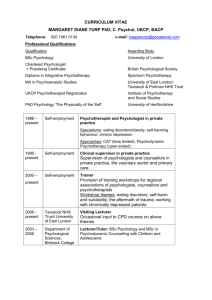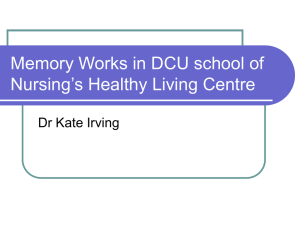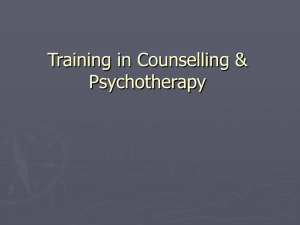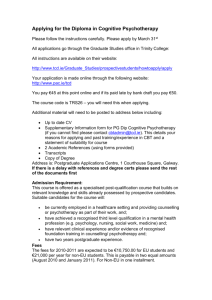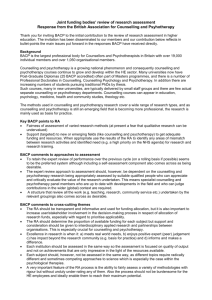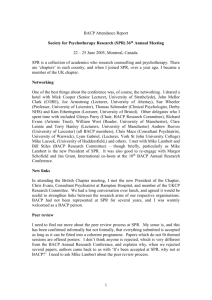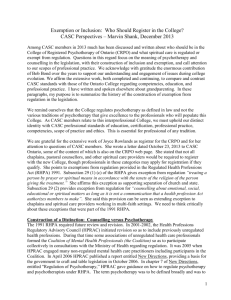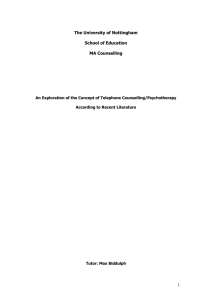ffps005nocls - Birkbeck College
advertisement
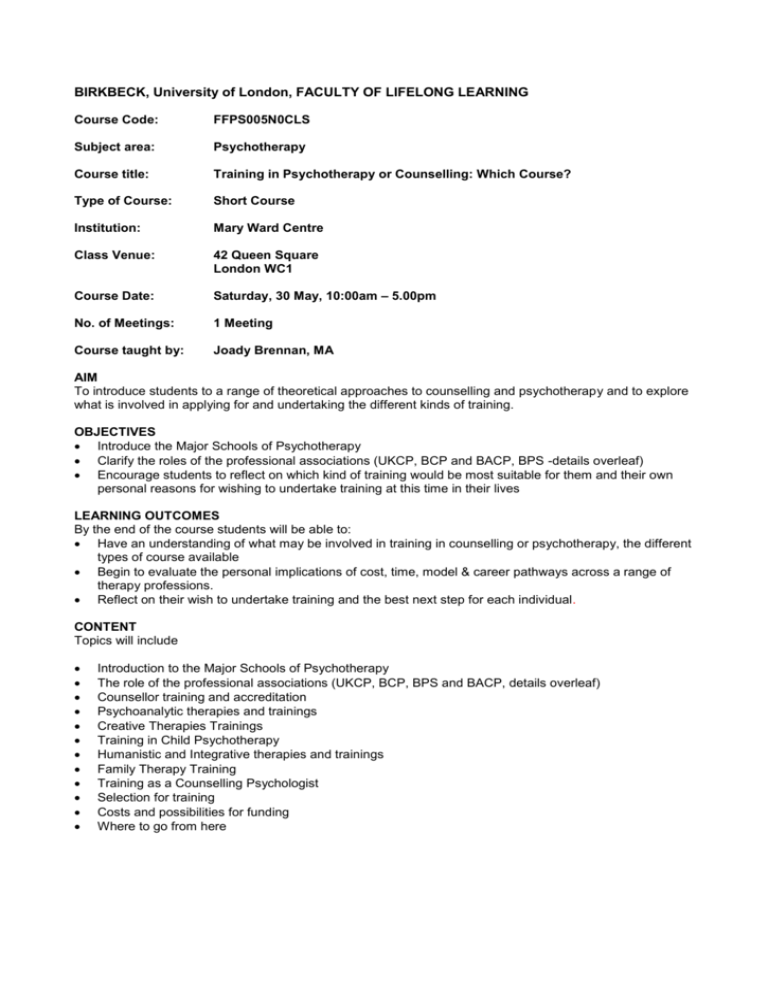
BIRKBECK, University of London, FACULTY OF LIFELONG LEARNING Course Code: FFPS005N0CLS Subject area: Psychotherapy Course title: Training in Psychotherapy or Counselling: Which Course? Type of Course: Short Course Institution: Mary Ward Centre Class Venue: 42 Queen Square London WC1 Course Date: Saturday, 30 May, 10:00am – 5.00pm No. of Meetings: 1 Meeting Course taught by: Joady Brennan, MA AIM To introduce students to a range of theoretical approaches to counselling and psychotherapy and to explore what is involved in applying for and undertaking the different kinds of training. OBJECTIVES Introduce the Major Schools of Psychotherapy Clarify the roles of the professional associations (UKCP, BCP and BACP, BPS -details overleaf) Encourage students to reflect on which kind of training would be most suitable for them and their own personal reasons for wishing to undertake training at this time in their lives LEARNING OUTCOMES By the end of the course students will be able to: Have an understanding of what may be involved in training in counselling or psychotherapy, the different types of course available Begin to evaluate the personal implications of cost, time, model & career pathways across a range of therapy professions. Reflect on their wish to undertake training and the best next step for each individual. CONTENT Topics will include Introduction to the Major Schools of Psychotherapy The role of the professional associations (UKCP, BCP, BPS and BACP, details overleaf) Counsellor training and accreditation Psychoanalytic therapies and trainings Creative Therapies Trainings Training in Child Psychotherapy Humanistic and Integrative therapies and trainings Family Therapy Training Training as a Counselling Psychologist Selection for training Costs and possibilities for funding Where to go from here TEACHING AND LEARNING METHODS A range of teaching methods may be used, eg. general lectures, exercises to help students reflect on their wish to train (there will be opportunities to share reflections). Students will be encouraged to ask questions throughout the day. It is expected that approximately 75% of the course content will be covered in class METHODS OF ASSESSMENT The course is not formally assessed. Students will be asked to use self-assessment as part of the course evaluation. READING: No reading is required before attending the course. However, students may find the following interesting to browse. Malcolm C. Cross, Linda Papadopoulos Becoming a Counsellor: A Manual for Personal and Professional Development Brunner-Routledge London 2001 Irvin D Yalom The Gift of Therapy: Reflections on Being a Therapist 2003 or Love’s Executioner & other Tales of Psychotherapy 1991 Oliver Sacks The Man Who Mistook His Wife For A Hat: And Other Clinical Tales 1985 Robert Lindner The Fifty-Minute Hour 1999 Ed. E. Noonan & L. Spurling, The Making of a Counsellor, Routledge 1992 Essays written by students of the Diploma in Student Counselling and Diploma of Adult Counselling run by Birkbeck College which show how student's classroom learning of theory is applied to their counselling work. Counselling in Action Series. Sage Publications Each volume covers a particular area of counselling/therapy including: Patricia M d'Ardenne, Aruna Mahtani Transcultural Counselling in Action Windy Dryden Handbook of Individual Therapy Sage 2002 Presents a comprehensive overview of the key approaches to individual therapy practice Schapira, S Choosing a Counselling or Psychotherapy Training: Routledge 2000 Professional Bodies You may also find the training links on these websites helpful. www.psychotherapy.org.uk United Kingdom Council on Psychotherapy www.bacp.co.uk British Association for Counselling & Psychotherapy www.bps.org.uk British Psychological Society www.acp-uk.eu Association of Child Psychotherapists www.aft.org.uk/ Association for Family Therapy & Systemic Practice in the UK www.baat.org.uk British Association for Art Therapy www.badth.org.uk British Association for Drama therapy www.bcp.org.uk British Psychoanalytic Council During the course the lecturer may also recommend other reading material. Revised 2008
